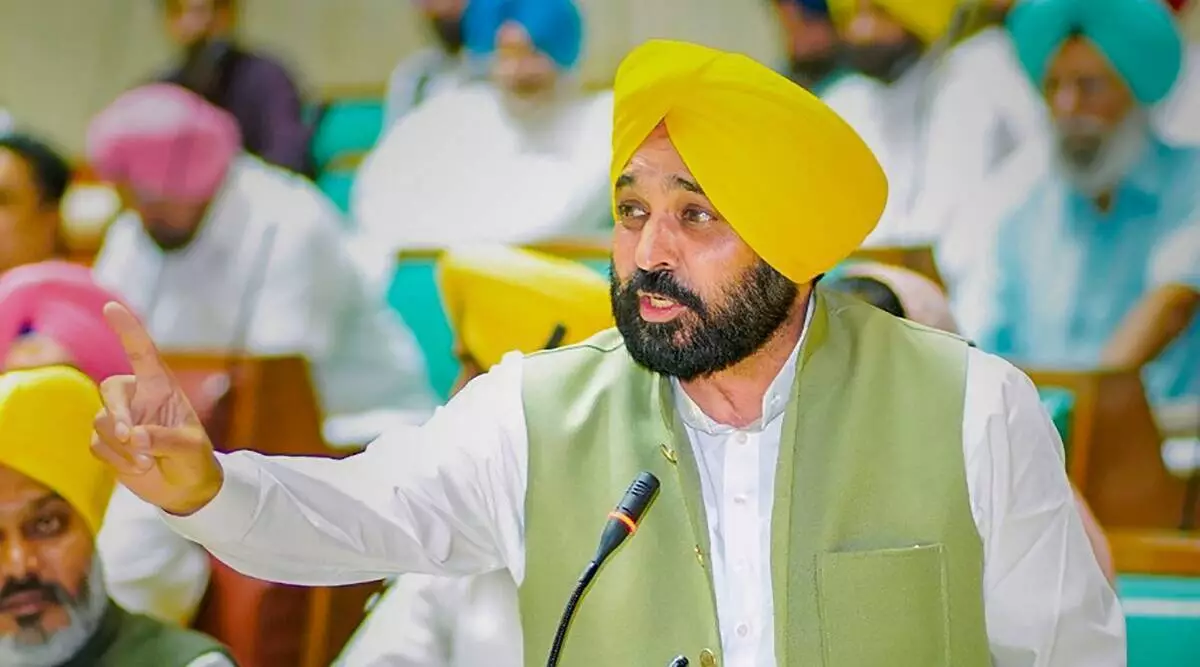

Punjab Chief Minister Bhagwant Mann
<p>
Rank confusion prevails in the corridors of power in Punjab as the government is unable to put on trial several IAS officers involved in corruption cases though Chief Minister Bhagwant Mann has been claiming that his government would not spare anyone involved in corruption either in the past or now.</p>
<p>
The Vigilance Bureau is getting no response on its requests to the Punjab government – read Chief Secretary -&nbsp; for getting the Government of India&rsquo;s (GoI) sanction to prosecute IAS officers booked for corruption in the state. This is mandatory under the Prevention of Corruption Act 1988.</p>
<p>
According to information made available by the department of personnel, at least seven serving and recently retired IAS officers involved in cases of colossal corruption could not be put on trial in the absence of prosecution sanction from the GoI. One of these officers happens to be the Chief Secretary (CS), Vijay Kumar Janjua who was arrested by the Vigilance Bureau in 2009 for accepting a bribe of Rs 2 lakh.</p>
<p>
A senior bureaucrat explains that the all-powerful IAS lobby that is at the helm of the state and the centre stonewalls action against its colleagues on one pretext or the other. This is the reason that prosecution sanction is not granted against an IAS officerno matter&nbsp; how serious the case may be.</p>
<p>
An IAS officer Vikas Garg, now secretary, transport, arrested by the Vigilance Bureau for having sold 6000 sq yards of government land in Patiala worth Rs 250 crore to private buyers in 2012 has not been prosecuted as the sanction from GoI has not come through. He escaped the dragnet as the then Chief Minister Parkash Singh Badal helped him and ordered the closure of the Vigilance Bureau case against him. The Vigilance Bureau told the court that since there is an inordinate delay in receiving the prosecution sanction the FIR against Garg be cancelled.</p>
<p>
The infamous Rs 1000 crore irrigation scam which occurred during the Badal regime could not progress as the Vigilance Bureau is unable to get the prosecution sanction to proceed against three senior IAS officers since retired including a former chief secretary, Sarvesh Kaushal. The then minister in-charge Janmeja Singh Sekhon has also gone scot-free. The main accused contractor Gurinder Singh Bhappa, now out on bail, had given inconvertible evidence against these officers and had recorded his confession before a judge which as per law is undeniable evidence.&nbsp;</p>
<p>
R.G.Sahota, PCS, former ADC Ferozepur involved in arms&#39; license scandal worth crores of rupees too did not face trial in court due to refusal to grant prosecution sanction by the Punjab government.</p>
<p>
Paramjit Singh IAS Director Transport, arrested by the CBI on charges of accepting bribes too awaits trial for want of prosecution sanction even though a &#39;challan&#39; has been presented in the court.</p>
<p>
R.S. Bains senior advocate, Punjab &amp; Haryana High Court explained, &quot;Under the PC Act GoI is the competent authority to grant prosecution sanction which is mandatory to put an IAS officer on trial in court,&quot; adding &quot;if an officer faces action for committing corruption during the official discharge of his duties like taking a particular decision, a recommendation by the state government to the GoI for prosecution sanction is required.&quot;</p>
<p>
Another High Court lawyer quoting a Supreme Court Judgment in the Vineet Narain and others Vs Government of India case said, &quot;if the prosecution sanction under PC Act section 19 is not granted in three months, it should be deemed to have been given.&quot; He further added that &quot;the department of personnel and training (DoPT), in the light of the SC ruling issued a circular to all departments and the state governments making a&nbsp; 3-month limit a part of its standing instructions.&quot;</p>
<p>
In a very bold opinion, senior advocate Ranjan Lakhanpal says, &quot;Prosecution sanction in cases under the PC Act though required, the superior courts have held that it is not a hard and fast rule. In the case of Surjit Singh Vs State of Punjab, the Punjab and Haryana High Court dispensed with the need of prosecution sanction.&quot;</p>
<p>
To a question, Lakhanpal explained, &quot;the judges in the trial courts have full freedom to start proceedings even in the absence of prosecution sanction but the governments and the accused are known to exert extra-judicial influence on the courts to stall action. The superior courts have held that in the absence of prosecution sanction the process of law and justice does not in any way get vitiated.&quot;</p>
<p>
Advocate Vaibhav Sehgal who is contesting the case against Punjab CS Janjua maintains, &quot;the benefit of prosecution sanction can only be given to an officer who in the official discharge of his duties makes a bona fide mistake and needs to be protected from malicious litigation. But, in cases where an officer is caught red-handed the benefit of prosecution sanction cannot be allowed.&quot; His contentions are based on three judgments of the Supreme Court which will be placed before the court tomorrow when Chief Secretary Janjua&#39;s case comes up for a hearing.</p>
Prime Minister Narendra Modi interacted with members of the Indian diaspora here on Wednesday as…
The city of Hamburg in Germany is set to host the 11th edition of India…
The International Atomic Energy Agency (IAEA) has confirmed that two Iranian centrifuge production facilities, TESA…
The human rights department of the Baloch National Movement (BNM), Paank, has strongly condemned the…
In a major boost to India's coastal defence capabilities, the Indian Navy on Wednesday commissioned…
Volker Turk, the UN High Commissioner for Human Rights, on June 17 expressed concern over…